Charlemagne's Practice of Empire
- Author: Jennifer R. Davis, Catholic University of America, Washington DC
- Date Published: June 2017
- availability: Available
- format: Paperback
- isbn: 9781107434134
Paperback
Other available formats:
Hardback, eBook
Looking for an inspection copy?
This title is not currently available on inspection
-
Revisiting one of the great puzzles of European political history, Jennifer R. Davis examines how the Frankish king Charlemagne and his men held together the vast new empire he created during the first decades of his reign. Davis explores how Charlemagne overcame the two main problems of ruling an empire, namely how to delegate authority and how to manage diversity. Through a meticulous reconstruction based on primary sources, she demonstrates that rather than imposing a pre-existing model of empire onto conquered regions, Charlemagne and his men learned from them, developing a practice of empire that allowed the emperor to rule on a European scale. As a result, Charlemagne's realm was more flexible and diverse than has long been believed. Telling the story of Charlemagne's rule using sources produced during the reign itself, Davis offers a new interpretation of Charlemagne's political practice, free from the distortions of later legend.
Read more- Offers a new interpretation of a pivotal reign in European history, contributing to major debates about the development of medieval history and the formation of Europe
- Examines Charlemagne's realm as a diverse, multiethnic empire
- Reaches beyond the typical geographical frame of Carolingian history to examine how empire was learned in conquered regions
Reviews & endorsements
'Historians have rightly emphasized the importance of religion to Charlemagne and his contemporaries. In this refreshingly original, lucid and strongly argued book, Jennifer R. Davis shows that ideology is only part of the story. Finding what worked empirically was what drove Charlemagne's practice of empire, and produced some enduring effects.' Janet Nelson, King's College London
See more reviews'Jennifer R. Davis' study fundamentally revises older romantic images of Charlemagne's empire as a short period of a Renaissance of central authority and imperial unity. Exploring its formation as the result of an experimental process that was much more shaped by practical reason than by ideology, by pragmatic flexibility, and by fuzzy conceptions than by the implementation of an imperial master plan, Davis provides us with a fresh look at the formation of a new imperial culture, which shaped European politics for many centuries to come.' Helmut Reimitz, Princeton University, New Jersey
'Davis has written not yet another Charlemagne biography, but rather an audacious reassessment of his reign as a crucial episode in the history of European rulership and governance. Deeply learned, meticulously researched, and subtly argued, it is a model for how to write pre-modern political and institutional history in the twenty-first century.' Adam J. Kosto, Columbia University, New York
'With this prodigious study, Jennifer R. Davis has announced herself as an important scholar of Carolingian politics.' Hans Hummer, German History
'This book has already established itself as essential reading for specialists of the period and for all historians concerned with the question of empire and pre-modern states. It manages to combine the study of institutions of government with that of networks of power, too often seen as contradictory. It suggests approaching the great sovereigns in terms of their concrete actions, leaving aside for the moment how they were represented. The results are convincing and even astonishing, because even if the author did not set out to write a biography, by the end of the book, the reader is left with an original impression of the personality of Charlemagne.' Martin Gravel, Revue historique
'In some ways this is a radical book … But while the arguments are bold, the underlying scholarship is sound and thorough … [Jennifer R. Davis] has written an important book brimming with new ideas and suggestions for further research.' C. M. A. West, The English Historical Review
'This book has much to offer scholars of the early Middle Ages. Davis gleans as much from of the sources as possible, but rather than force the evidence into a particular vision or framework of empire, she's able to elucidate both the specific political practices and broader outlines of Charlemagne's rulership. Additionally, she is able to address the extensive body of scholarship on Charlemagne's reign, balancing older, still relevant works, such as that of the eminent François-Louis Ganshof, with more recent studies of Charlemagne's reign. This is an important contribution to the still-growing body of work on early medieval politics and Carolingian kingship.' Jace Stuckey, Speculum
'Jennifer Davis's new book combines the traditional and the new in intriguing and productive ways … an important and distinctive view of Charlemagne and his rule … Davis's study encourages us all to think substantially harder about what exactly Charlemagne was trying to do, the methods he used and both his successes and failures.' Rachel Stone, Early Medieval Europe
'Charlemagne's Practice of Empire is a challenging read - the type that forces the reader to immediately think about how to react to it. It is as provocative as it is profound, and which will hopefully become a standard work of reference for the years to come, inspiring students and more advanced scholars alike.' Rutger Kramer, Sehepunkte
'This is material with which Davis is intimately familiar, and her command of the subtleties of these texts and their manuscript traditions comes through clearly throughout the volume … Whether one accepts some or all of Davis' conclusions, her study is now essential reading for all specialists working on early medieval Europe. Essential.' David S. Bachrach, H-France Review
Customer reviews
Not yet reviewed
Be the first to review
Review was not posted due to profanity
×Product details
- Date Published: June 2017
- format: Paperback
- isbn: 9781107434134
- length: 551 pages
- dimensions: 230 x 152 x 28 mm
- weight: 0.8kg
- contains: 3 b/w illus. 2 maps 5 tables
- availability: Available
Table of Contents
Introduction
Part I. Strategic Rulership: Introduction: tools of control and coercion
1. Managing royal agents
2. Disciplining royal agents
3. Fractured control: Charlemagne's response to dissent
Conclusion: control and its limits
Part II. Center and Region in Charlemagne's Empire: Introduction: unity and diversity in Charlemagne's empire
4. An empire of regions?
5. The conquered regions as arenas for experimentation
6. The nature of the empire: centralization and communication
Conclusion: the imperial character of Charlemagne's realm
Part III. An Empire of Practice: Introduction: continuity, change, and the building of an empire
7. The chronology of the reign
8. Recta via: the dynamics of political change
Conclusion: an empire of practice
Conclusion: Charlemagne's invention of medieval rulership
Bibliography
Index.
Sorry, this resource is locked
Please register or sign in to request access. If you are having problems accessing these resources please email [email protected]
Register Sign in» Proceed
You are now leaving the Cambridge University Press website. Your eBook purchase and download will be completed by our partner www.ebooks.com. Please see the permission section of the www.ebooks.com catalogue page for details of the print & copy limits on our eBooks.
Continue ×Are you sure you want to delete your account?
This cannot be undone.
Thank you for your feedback which will help us improve our service.
If you requested a response, we will make sure to get back to you shortly.
×
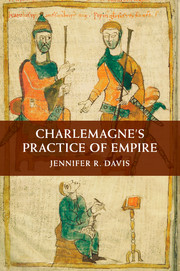
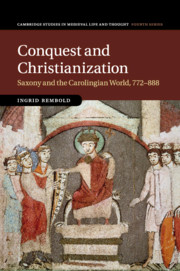
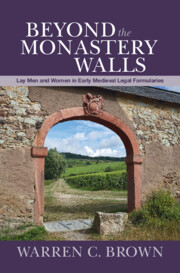
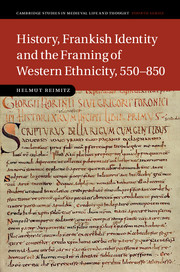
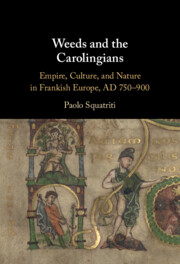
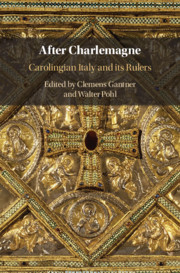
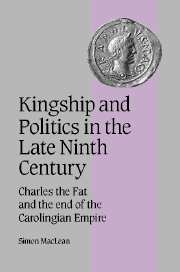
.jpg)
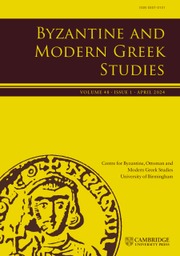
.jpg)
